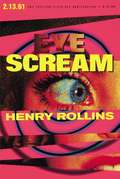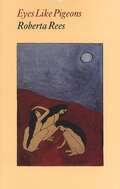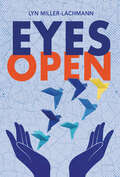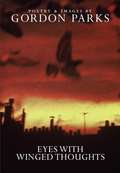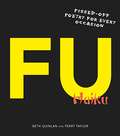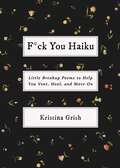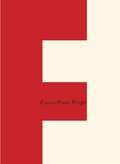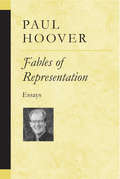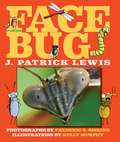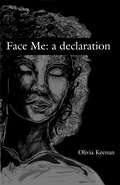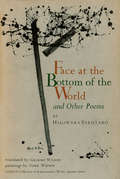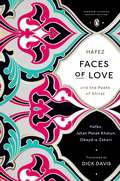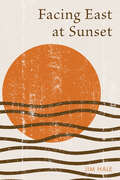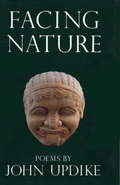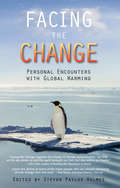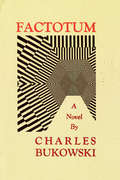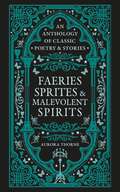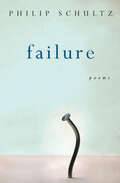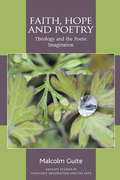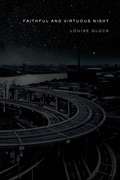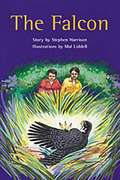- Table View
- List View
Eye Scream
by Henry Rollins"Work on Eye Scream started in 1986. I was crossing America constantly andexperiencing the morality shifts, attitudes, and rituals in different partsof the country - the difference in the way people were in the Bible Belt asopposed to New York City, the way blacks and whites interfaced, theintolerance of homosexuality, the morality plays. I started to become awareof how brutal the country is and how much ferocity, cruelty, and oppressionare inherent in the culture and how much of it was in me. I wanted todocument it and create a book that brought the whole thing to a boil and see where it left me off. In the summer of 1995, I finished the book and startedto edit. Re-reading the manuscript over and over, I realized all the things Ihad picked up over a decade of playing Devil's advocate and it was inspiringbecause it clearly defined who my enemies are. As an American, I feel itimpossible not to be infuriated by the way things are and have been. I refuseto be happy about the day-to-day and go along with it. There's too muchspitting in my face and too much spitting in the faces of people who don'tknow any other way of life. This book is brutal, and at times, funny. I knowthat I will probably get a ton of shit for Eye Scream. Enjoy, or betteryet... don't." ---- Henry Rollins
Eyes Like Pigeons
by Roberta ReesCo-winner of the 1992 Gerald Lampert Award. Winner of the 1992 Writers Guild of Alberta Award for Poetry Eyes Like Pigeons, Roberta Rees' long poem, comes back, always, to this: "… Thi' in Vietnamese means poetry." Thi, a Vietnamese refugee, is this book’s associational matrix; playing with the possibilities of her name, Rees writes of Thi, poetry both self-reflexive and self-reflective, and immensely different from that which idealizes women with cliches like the title of this volume. The poetry she finds through Thi is as harsh as it is beautiful; its content as sorrowful as the style is liberating, joyful.
Eyes Open
by Lyn Miller-LachmannPortugal, 1967. Sónia thinks she knows what her future holds. She’ll become a poet, and together she and her artist boyfriend, Zé Miguel, will rise above the government restrictions that shape their lives. The restrictions on what Sónia can do and where she can go without a man’s permission. The restrictions on what music she can enjoy, what books she can read, what questions she can ask. But when Zé Miguel is arrested for anti-government activities and Sónia’s family’s restaurant is shut down, Sónia’s plans are upended. No longer part of the comfortable middle class, she’s forced to leave school and take a low-paying, grueling, dangerous job. She thought she understood the dark sides of her world, but now she sees suffering she never imagined. Without the protection of her boyfriend or her family, can Sónia find a way to fight for justice? This poignant novel in verse follows a teen girl discovering how to resist tyranny and be true to herself.
Eyes with Winged Thoughts: Poems and Photographs
by Gordon ParksIn Eyes with Winged Thoughts, the forty-four photographs and fifty-eight poems, reflecting on his long and extraordinary life, offer a rare glimpse of his thoughts and feelings about everything from romantic love to the Iraq war and the passing of Pope John Paul II. He has done it all. Gordon Parks's life is an astonishing litany of firsts: in the 1940s he was the first African-American photographer to work for the Farm Security Administration and for Vogue and Life magazines; in the 1960s he would become the first African-American director of a major motion picture. A dominating figure in contemporary American culture, he is an artist of uncompromising vision and creativity. In 2002 Parks received the Jackie Robinson Foundation Lifetime Achievement Award and was inducted into the International Photography Hall of Fame, just the latest in a series of honors that began when he received a prestigious Julius Rosenwald Fellowship in 1941 and which now includes an Emmy, a National Medal of the Arts, and over fifty honorary doctorates. Now in his nineties, he could easily rest on his laurels, but the luminous photographs on display in Eyes with Winged Thoughts and the poems -- some meditative and lyrical, some raw with emotion about the war in Iraq and the tragedy of the tsunami -- show that he is still a true American Renaissance man.
Ezjakintasunak
by Gerardo Markuleta GutiérrezJakinaren gainean, ezjakina na-hiago askojakina baino. Bizi bakarra gutxiegi baita buruz bizitzen ikasteko. Dakiguntxoak ez, ez dakigunak adierazten gaitu ondoen.<P> Nabigazioak, jakina, barne kostaldeetan barrena jarraitzen du. Lur umeleko paisaiak dira: gizakiok, berbak eta atxikimenduak endredatuz, ehundu ohi ditugun tratu-molde zaharberrituak.<P> Gero, labur-laburraren esparrua: ekialdera gura gabe, haiku baino areago “kaiku” modukoak. Eta epigrama tankerako zenbait ziri-marra, ondoren.<P> Azkenik –baina ez atzenik–, beste hainbat irrigai: zirrikituez, hauskortasunaz eta artefaktu berbazkoak egiteko grina lagagaitz honetaz.
Ezra Pound
by Betsy ErkkilaNo one better symbolizes the course of modern literature its triumphs and defeats than Pound. From the dreaminess and aestheticism of his early poems, to his Imagist and Vorticist manifestos, to the formally experimental method and mythic engagement with history in The Cantos, Pound marks the path that modern and postmodern poetry would follow. This collection provides a documentary record of the reviews of Ezra Pound's work in contemporary journals and newspapers, an introduction that traces the public outrage and controversy that characterized Pound's reception, and checklists of all known reviews of Pound's work. Most of the major poets and critics of the twentieth-century reviewed Pound's work, including T. S. Eliot, Ford Maddox Ford, William Carlos Williams and Edmund Wilson. Their multiple, perplexed, and sometimes hostile responses to his work provide a rich record of the struggles that marked the emergence of modern and contemporary poetry and poetics.
F U Haiku
by Perry Taylor Beth QuinlanEnough already. The Mary Sunshine act has got to go. The economy sucks, unemployment has reached an all-time high, and the ozone is beyond repair. But when all feels futile, there’s this hilarious compilation of 200-plus rants that give you permission to ditch the rose-colored glasses and have a satisfying laugh at the expense of those who piss you off.From spiteful sex and workplace BS to road rage and famous F Us, you’ll find humorous verbal bitch-slaps to any and all of life’s most annoying and abusive moments.Think of it as therapy, with an edge.
F*ck You Haiku: Little Breakup Poems to Help You Vent, Heal, and Move On
by Kristina GrishGet through any relationship split with this collection of relatable, impassioned, and irreverent breakup haikus.When her marriage came to a sudden and infuriating end, celebrated relationship columnist Kristina Grish found solace in a unique outlet—penning fiery breakup haikus. Now, she shares her cathartic creations in a compilation designed to guide you through the wreckage of your split. In F*ck You Haiku, Kristina has compiled more than 100 breakup haikus— drawing inspiration from her own tumultuous love affairs and universal experiences that strike a chord with us all. These poetic gems serve as a lifeline for anyone grappling with heartbreak, providing a cathartic path to healing. Representing a range of emotions and clever ways to vent about your ex, these haikus are entertaining and enraging, as well as enlightening and empowering. So, if you&’re currently going through a breakup—whether you did the deed or are on the receiving end of it—let this collection of inventive poems help you say &“f*ck you&” to that special someone and eventually &“love you&” to yourself.
F: Poems
by Franz WrightIn these riveting poems, Wright declares, "I've said all that / I had to say. / In writing. / I signed my name. / It's death's move." As he considers his mortality, the poet finds a new elation and clarity on the page, handing over for our examination the flawed yet kneeling-in-gratitude self he has become. F stands both for Franz, the poet-speaker who represents all of us on our baffling lifelong journeys, and for the alphabet, the utility and sometimes brutality of our symbols. (It may be, he jokes grimly, his "grade in life.") From "Entries of the Cell," the long central poem that details the loneliness of the single soul, to short narrative prose poems and traditional lyrics, Wright revels in the compensatory power of language, observing the daytime headlights following a hearse, or the wind, "blessing one by one the unlighted buds of the backbent peach tree's unnoted return." He is at his best in this beautiful and startling collection.ent peach tree's unnoticed return." He is at his best in this beautiful and startling collection. From the Hardcover edition.
Fables of Representation
by Paul HooverFrom the acclaimed author of Winter (Mirror) and Rehearsal in Black, Fables of Representation is a powerful collection of essays on the state of contemporary poetry, free from the stultifying theoretical jargon of recent literary history. With its title essay, "Fables of Representation," one of the most cogent studies ever written of the New York School of poets (a group that includes the influential poet John Ashbery), this book is required reading for anyone who seeks to understand the poetry and culture of the postmodern period. Author Paul Hoover's wide-ranging subjects include African-American interdisciplinary studies; the position of poetry in the electronic age; the notion of doubleness in the work of Harryette Mullen and others; the lyricism of the New York School poets; and the role of reality in American poetry. Hoover also introduces two provocative essays sure to generate attention and discussion: "The Postmodern Era: A Final Exam" and "The New Millennium: Fifty Statements on Literature and Culture."
Face Bug
by J. Patrick Lewis Kelly Murphy Fred SiskindIn this ingenious picture book, Children's Poet Laureate J. Patrick Lewis invites you to visit the Face Bug Museum. There, readers can meet fourteen bugs in Lewis's sly, humorous poems; gaze upon giant close-ups of the creatures' faces in Siskind's photographs; and follow the antics of two beetle friends in Kelly Murphy's artwork. This is a trip to a museum-built by bugs, for bugs-unlike any other. It is also a poetry collection, macro-photography book, and illustrated story-all in one. Includes end notes with photographs of the entire bugs and further information about these creatures.
Face Me: A Declaration
by Olivia KeenanFace Me: a declaration reveals the complexities of a mixed race identity through religion, sex, American history, and colorism. The poems in Face Me reject any white supremacy that dictates Biblical interpretations, historical truths, and beauty standards. This collection of poems follows a journey that begins in uncertainty, but concludes in celebration. Within its pages, declarations are unwaveringly signed and spoken. Black bodies are praised and exalted. Faith is reexamined and reclaimed. And Face Me exists not as a question, but as a command.
Face at the Bottom of the World and Other Poems
by Graeme Wilson Hagiwara Sakutaro York WilsonThe poetry of Hagiwara Sakutaro is still little known in the in the English-speaking world, though this is not altogether surprising when the importance of his work remains inadequately recognized in Japan itself. Nearly all Japanese critiques of post-Meiji poetry acknowledge Hagiwara as one of the best (if not, indeed, the very best) of modern Japanese poets; but almost all critics, having briefly made some such admission, thereafter shy away from him, strangely to devote long paragraphs to other poets patently less talented, sadly more diffuse and far less influential. Why? Perhaps the reason is that Hagiwara, for all his brilliance, seems somehow to switch on darkness, to radiate black luminance. In the beaconry of modern Japanese literature he is an occulting, rather than a flashing, light: but he remains nevertheless a lighthouse of supreme importance.
Face at the Bottom of the World and Other Poems
by Graeme Wilson Hagiwara Sakutaro York WilsonThe poetry of Hagiwara Sakutaro is still little known in the in the English-speaking world, though this is not altogether surprising when the importance of his work remains inadequately recognized in Japan itself. Nearly all Japanese critiques of post-Meiji poetry acknowledge Hagiwara as one of the best (if not, indeed, the very best) of modern Japanese poets; but almost all critics, having briefly made some such admission, thereafter shy away from him, strangely to devote long paragraphs to other poets patently less talented, sadly more diffuse and far less influential. Why? Perhaps the reason is that Hagiwara, for all his brilliance, seems somehow to switch on darkness, to radiate black luminance. In the beaconry of modern Japanese literature he is an occulting, rather than a flashing, light: but he remains nevertheless a lighthouse of supreme importance.
Faces of Love: Hafez and the Poets of Shiraz
by Dick DavisA giant of world literature, an eloquent princess, a dissolute satirist these are the three voices translated from fourteenth-century Persian by Dick Davis in Faces of Love. Together, they represent one of the most remarkable literary flowerings of any era. All three Hafez, Jahan Malek Khatun, and Obayd-e Zakani lived in Shiraz, a provincial capital in south-central Iran, and all drew support from arts-loving rulers at a time better known for invasions and political violence. Love was a frequent subject of their work: spiritual as well as secular, in varieties embracing every aspect of the human heart. They could hardly have been more different. Hafez destined to win fame throughout the world wrote lyrical poetry that was subtle, elusive, and rich in ambiguity. Jahan largely forgotten until recent decades was a privileged princess who could evoke passion, longing and heartbreak with uncanny power. (As Davis says: "To have this extraordinary poet's fascinating and often very beautiful poems emerge from six hundred years of virtual oblivion seems almost miraculous". ) Obayd a satirist and truth-teller celebrated every pleasure of the flesh in language of astonishing and occasionally obscene honesty. In his introduction, Davis himself a gifted poet as well as an acclaimed translator and scholar of Persian literature describes the turbulent world of the three poets and recounts what is known of their lives. His scene-setting includes explanations of poetic conventions of the day: the rules of rhyming and meter, the stylised relationship between author and subject, and the way language sometimes hovers between male and female or between sacred and secular meanings. Detailed explanatory notes follow the poems, along with some personal reflections on the challenge of trying to catch the poetic genius of a culture distant in space and time. Dick Davis does it brilliantly: Faces of Love is a bridge that carries us to another age.
Facing East at Sunset
by Jim HaleDo you want to return to a time in your life when things were wonderful, filled with people you loved, with dreams that you had, when the world was simpler and the future glistened? And do you wonder what happened, where did those years go? The answer, my friend (no, not with Bob Dylan), is with you inside your head, all the good and some of the bad. The answer is writing it down – it’s still there – in poetry. Reading others, writing your own. Think back – it’s still there – look back, look forward… poetry. Do you recall those violet-infested walls of that old English church; that girl you saw and never forgot in a tavern once visited; that old town you first taught in and that noisily funny dunny-cart man; the fear of being trapped in a crashed car with petrol dripping; resting in love with a beautiful partner; dangling a line in a beautiful river with beautiful sons? It’s all there, deep down, relived and reloved, in poetry.
Facing Nature
by John UpdikeJohn Updike's fifth collection of poetry faces nature on a number of levels. An opening section of sonnets touches upon death, aging, and, in a sequence of describing a week in Spain, insomnia and dread. The poems that follow consider nature in the form of seasons, of planting trees and being buried, of shadow and rain, of pain and accumulation, and of such human diversions as art and travel. The last poem here, and the longest in the book, undertakes a walking tour of each of Jupiter's four major moons, a scientific excursion that leads into the extravagant precisions of the "Seven Odes to Seven Natural Processes," a lyrical yet literal-minded celebration of some of the earthly forces that uphold and surround us. Finally, a dozen examples of light verse toy with such natural phenomena as presbyopia, the energy crunch, food, and sex. Like the best of the metaphysical poets, Mr. Updike embraces the world in all its forms and creates conceits out of the casual as well as the moments.
Facing the Change
by Steven Pavlos Holmes"Amidst the current deluge of statistics about global warming, this book provides a refreshing look at how individuals are affected. This is a beautiful book to keep near, open at random, and share the words of gifted writers as they prepare for the coming changes."-Publishers Weekly"Holmes, a scholar in environmental humanities, has assembled a rich, varied collection of personal accounts and poems...An artistic and intimate approach to the problem that humanizes our concerns."--Booklist"How do you respond when the familiar, benevolent, and predictable world you count on becomes strange, hostile, and chaotic? First, you must face it. Next, bear witness. Steven Holmes has gathered compelling testimonies about the ways our earthly home is changing in the short space of our own lifetimes. They beg us to pay attention and act. We are wise to heed these passionate voices."-Chip Ward, author of Hope's Horizon"These earnest and heartfelt poems, essays, and imaginings change our discourse from data to personal testimony, channeling 'care and concern.' Maybe, just maybe, these authors who call us to 'unheroic' action 'on life's behalf' will steer us away from tragedy and chaos. 'Emerging from denial is like moving from blindness to light.' As the refrain from one writer puts it, 'Good Lord! Good luck!'"-Stephen Trimble, author of Bargaining for Eden: The Fight for the Last Open Spaces in America"Facing the Change shares the stories of some of the many people in the US and the world who are already witnessing climate change here and now. They are giving us early warning signs; it's up to all of us to act now."-Mae Boeve, executive director of 350.org"Facing the Change registers the impact of climate destabilization, not only on the sky above us and the earth beneath our feet, but also within our hearts. The voices in this eloquent and original book convey the dread and grief, the anger, but also the experiences of love and community that are intensified by the defining ecological challenge of our time."-John Elder, author of Reading the Mountains of Home, editor of The Norton Book of Nature"These eloquent stories, essays, and poems by scores of 'emotional and cultural first responders' to the effects of climate change are sure to deliver a powerful wake-up call to anyone who has supposed that nothing an individual person can say or do will affect this impending disaster."-Lawrence Buell, author of The Environmental Imagination"...the contributors to Facing the Change have begun to reveal the experiential heart of a planetary process. This is a truly important project." -Scott Slovic, editor of ISLE: Interdisciplinary Studies in Literature and EnvironmentFilled not with bare facts and dire warnings but with evocative, accessible stories, essays, and poetry, Facing the Change shows how global warming is affecting the everyday lives of people today. A wide range of writers brings courage, honesty, and insight to one of the major issues of our lives.Steven Pavlos Holmes, Ph.D., is an independent scholar in the environmental humanities, with a special interest in people's personal experiences of the natural world. His first book, The Young John Muir: An Environmental Biography, won the Modern Language Association's Prize for Independent Scholars. He lives in Jamaica Plain, Massachusetts.
Factotum
by Charles BukowskiOne of Charles Bukowski's best, this beer-soaked, deliciously degenerate novel follows the wanderings of aspiring writer Henry Chinaski across World War II-era America. Deferred from military service, Chinaski travels from city to city, moving listlessly from one odd job to another, always needing money but never badly enough to keep a job. His day-to-day existence spirals into an endless litany of pathetic whores, sordid rooms, dreary embraces, and drunken brawls, as he makes his bitter, brilliant way from one drink to the next. Charles Bukowski's posthumous legend continues to grow. Factotum is a masterfully vivid evocation of slow-paced, low-life urbanity and alcoholism, and an excellent introduction to the fictional world of Charles Bukowski.
Faeries, Sprites & Malevolent Spirits: An anthology of classic poetry & stories
by Aurora ThorneStep into the enchanting realm of Faeries Sprites & Malevolent Spirits, where the exquisite beauty and treacherous allure of the unseelie court come to life through classic poetry.This captivating collection immerses you in the ethereal world of fairies, where enchantress lyrics and the longings of otherworldly lovers are woven together in verses that shimmer with magic and mystery. Each poem is a spell, cast in words that evoke the haunting perfume of desire and the dark allure of fae mischief.Within these pages, you'll find timeless works such as William Wordsworth's The Faery Chasm, Maurice Hewlett's The Lore of Proserpine and Christina Rossetti's Goblin Market. These poems, along with selection from William Shakespeare, and Alfred Lord Tennyson, blur the boundaries between reality and fantasy, drawing you into a landscape where the whispers of the unseelie court beckon you into their macabre dance.Faeries Sprites & Malevolent Spirits is a must-have for those entranced by the mystical, the magical, and the malevolent forces that dwell in the shadows of the faerie realm.
Faeries, Sprites & Malevolent Spirits: An anthology of classic poetry & stories
by Aurora ThorneStep into the enchanting realm of Faeries Sprites & Malevolent Spirits, where the exquisite beauty and treacherous allure of the unseelie court come to life through classic poetry.This captivating collection immerses you in the ethereal world of fairies, where enchantress lyrics and the longings of otherworldly lovers are woven together in verses that shimmer with magic and mystery. Each poem is a spell, cast in words that evoke the haunting perfume of desire and the dark allure of fae mischief.Within these pages, you'll find timeless works such as William Wordsworth's The Faery Chasm, Maurice Hewlett's The Lore of Proserpine and Christina Rossetti's Goblin Market. These poems, along with selection from William Shakespeare, and Alfred Lord Tennyson, blur the boundaries between reality and fantasy, drawing you into a landscape where the whispers of the unseelie court beckon you into their macabre dance.Faeries Sprites & Malevolent Spirits is a must-have for those entranced by the mystical, the magical, and the malevolent forces that dwell in the shadows of the faerie realm.
Failure: Poems
by Philip SchultzA Pulitzer Prize–winning poetry collection of &“heartbreaking tenderness&” (Gerald Stern). A driven immigrant father; an old poet; Isaac Babel in the author&’s dreams: Philip Schultz gives voice to failures in poems that are direct and wry. He evokes other lives, too—family, beaches, dogs, the pleasures of marriage, the terrors of 9/11, New York City in the 1970s (&“when nobody got up before noon, wore a suit/or joined anything&”)—and a mind struggling with revolutions both interior and exterior. Failure is a superb collection, &“full of slashing language, good rhythms [and] surprises&” (Norman Mailer). &“Philip Schultz&’s poems have long since earned their own place in American poetry. His stylistic trademarks are his great emotional directness and his intelligent haranguing—of god, the reader, and himself. He is one of the least affected of American poets, and one of the fiercest.&” —Tony Hoagland
Faith, Hope and Poetry: Theology and the Poetic Imagination (Routledge Studies in Theology, Imagination and the Arts)
by Malcolm GuiteFaith, Hope and Poetry explores the poetic imagination as a way of knowing; a way of seeing reality more clearly. Presenting a series of critical appreciations of English poetry from Anglo-Saxon times to the present day, Malcolm Guite applies the insights of poetry to contemporary issues and the contribution poetry can make to our religious knowing and the way we 'do theology'. This book is not solely concerned with overtly religious poetry, but attends to the paradoxical ways in which the poetry of doubt and despair also enriches theology. Developing an original analysis and application of the poetic vision of Coleridge, Larkin and Seamus Heaney in the final chapters, Guite builds towards a substantial theology of imagination and provides unique insights into truth that complement and enrich more strictly rational ways of knowing. Readers of this book will return to their reading of poetry equipped with new insights and enthusiasm and will be challenged to integrate imaginative ways of knowing into their other academic and intellectual pursuits.
Faithful And Virtuous Night: Poems
by Louise GlückWinner of the 2014 National Book Award for Poetry<P> A luminous, seductive new collection from the “fearless” (The New York Times) Pulitzer Prize–winning poet<P> Louise Glück is one of the finest American poets at work today. Her Poems 1962–2012 was hailed as “a major event in this country’s literature” in the pages of The New York Times. Every new collection is at once a deepening and a revelation. Faithful and Virtuous Night is no exception.<P> You enter the world of this spellbinding book through one of its many dreamlike portals, and each time you enter it’s the same place but it has been arranged differently. You were a woman. You were a man. This is a story of adventure, an encounter with the unknown, a knight’s undaunted journey into the kingdom of death; this is a story of the world you’ve always known, that first primer where “on page three a dog appeared, on page five a ball” and every familiar facet has been made to shimmer like the contours of a dream, “the dog float[ing] into the sky to join the ball.” Faithful and Virtuous Night tells a single story but the parts are mutable, the great sweep of its narrative mysterious and fateful, heartbreaking and charged with wonder.
Falcon (Rigby PM Chapter Books Emerald Levels 25-26, Fountas & Pinnell Select Collections Grade 3 Level P)
by Stephen HarrisonCarlos and Ricky arrive at a campsite with their father, where they discover a large injured bird. Dad identifies it as a falcon and he calls a nearby rescue center. Max and Lisa, from Raptor Center, put the falcon in a cage and take it back with them. The falcon does well and Max suggests the boys come to watch the release of the falcon in a few weeks. Later, the boys and their parents go to the place where the bird will be released. Their father tells them they should feel proud about helping to save the falcon, which flies off into the distance.
